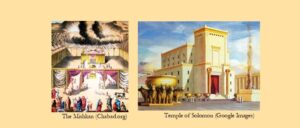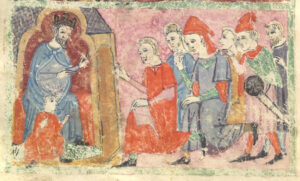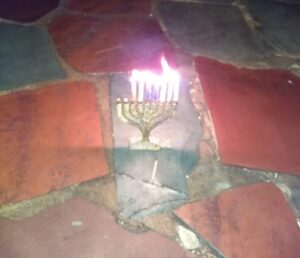Ruach HaYam teaching presented by Penina Weinberg
August 20, 2020
At 6:45pm ET, meeting will be open for logging in, schmoozing and solving any technical issues. [see below for details]
Study begins at 7:15 ET.
——>>>>>> Zoom login can be found in the Ruach HaYam study room
https://www.studywithpenina.com/ruach_hayam
——>>>>>> Only recognized names will be admitted to Zoom meeting. Please be sure to RSVP
Banner image is by David Lawrence and can be found at Octobergallery.com, which is one of the oldest African American art galleries in the nation. Lawrence’s Shekinah is a proud Black woman, lit from above and behind, who appears to see into your soul and out from hers.
Penina will be sharing a number of ideas which are interrelated, pulling together teachings and thoughts from Joy Ladin, Rabbi Julia Watts Belser, and “The New Jim Crow – Mass Incarceration in the Age of Colorblindness” by Michelle Alexander. This will be a conversation, thinking together about ideas of sin, victimization, racism, the voices of the prophets, the rabbis and the Shekhinah. This is very much a work in progress for Penina and she looks forward to thinking in community with friends of Ruach HaYam.
Alexander writes that one of the false ideas that drives mass incarceration of Black men – perpetuating a vast underclass that is identical to slavery – is the notion that Black men would not be imprisoned if they did not commit crimes. (Her book is based upon research on incarcerated Black men). This notion blames the victims of systemic racism for the injustices perpetrated upon them and justifies the loss of voting privileges, housing, employment and family. How is this notion similar or not to the Hebrew Bible claim that the downfall of the temples and the fall of the monarchy are the result of failures of the Israelites to worship as their God demands? Is the God of punishment in effect blaming the victim instead of the overwhelming might of Israel’s enemies: the Assyrians, Babylonians and Romans? Do the Prophets speak the language of blame the victim sometimes, and other times the language of the Shekhinah?
We will consider two teachings. One is Joy Ladin’s new poetry collection in process, called “Shekhinah Speaks”. Ladin’s Shekhinah is a bad-ass fully independent female divinity, not in the least a binary reflection of a male divinity. This Shekhinah is not the God of punishment, but the God who stands by the side of the human, flesh to flesh, pushing, prodding, saving from the ground up. Ladin describes Shekhinah as an alternative, decentralized, binary-dissolving way of thinking about how the Divine moves in and through us to make a more just society. You can learn in detail about this here
Rabbi Julia Watts-Belser, in her book “Rabbinic Tales of Destruction: Gender, Sex, and Disability in the Ruins of Jerusalem” presents a teaching on how the destruction of the Temple in Roman times is treated in Bavli Gittin. Here, she says, the rabbis do not blame the victims, do not suggest that Jerusalem fell to the Romans because they sinned and God punished. Instead the rabbis describe the overwhelming force of the Roman conquerors and the toll they take upon the bodies of the people. You can see a teaching by Rabbi Belser, where she reflects on “The God Who Suffers With” here Perhaps we will find Belser’s “God With” is a bit like Ladin’s “Shekhinah”
Penina Weinberg is an independent Hebrew bible scholar whose study and teaching focus on the intersection of power, politics and gender in the Hebrew Bible. She has run workshops for Nehirim and Keshet and has been teaching Hebrew bible for 10 years. She has written in Tikkun and HBI blog, and is the leader and founder of Ruach HaYam.
*** Ruach HaYam https://www.facebook.com/groups/Ruach.HaYam/ study sessions provide a queer Jewish look at text, and are welcoming to LGBTQ+ and allies, to any learning or faith background, to all bodies, and friendly to beginners***
 Ruach HaYam teaching presented by Penina Weinberg February 28 2021
Ruach HaYam teaching presented by Penina Weinberg February 28 2021

 Ruach HaYam teaching presented by Penina Weinber
Ruach HaYam teaching presented by Penina Weinber